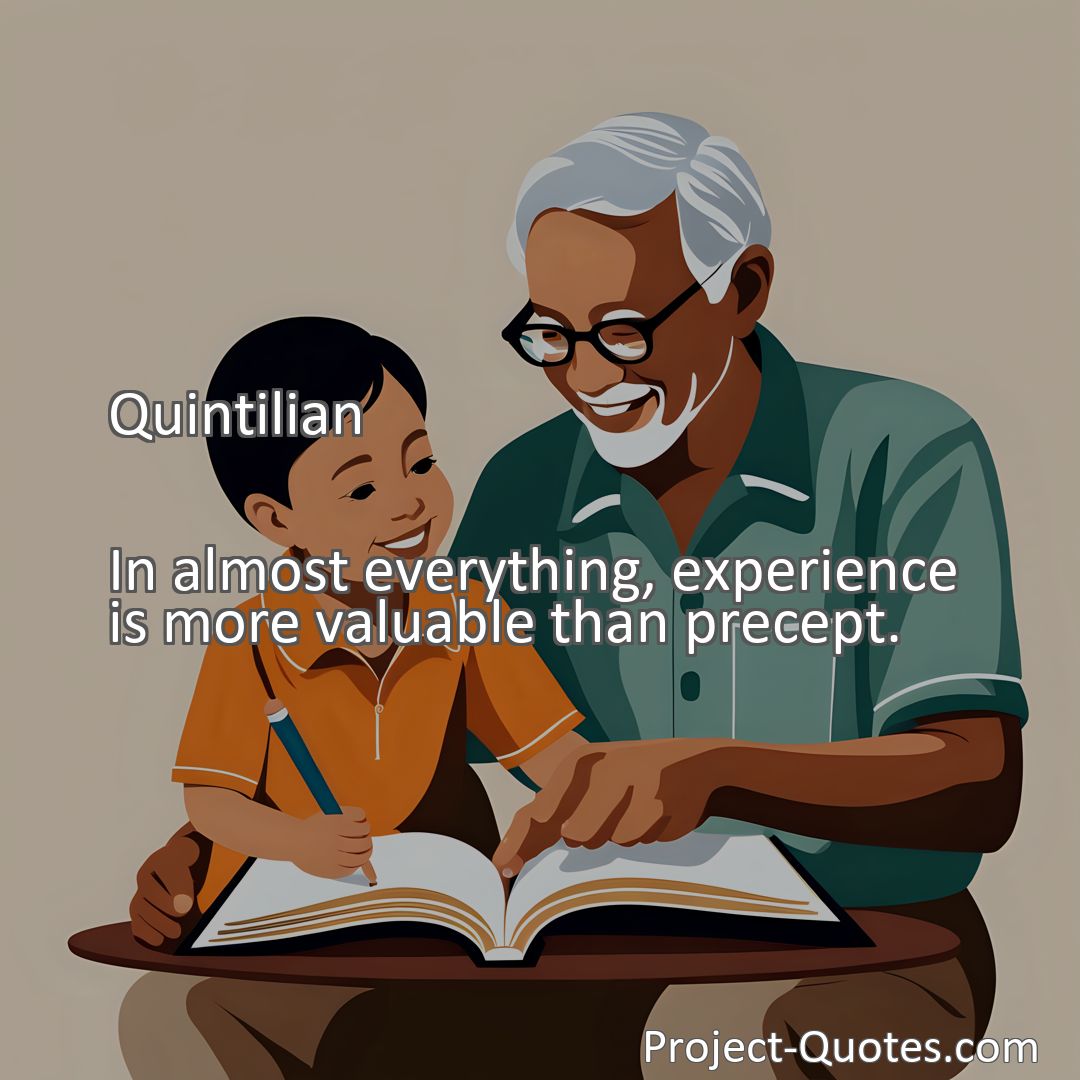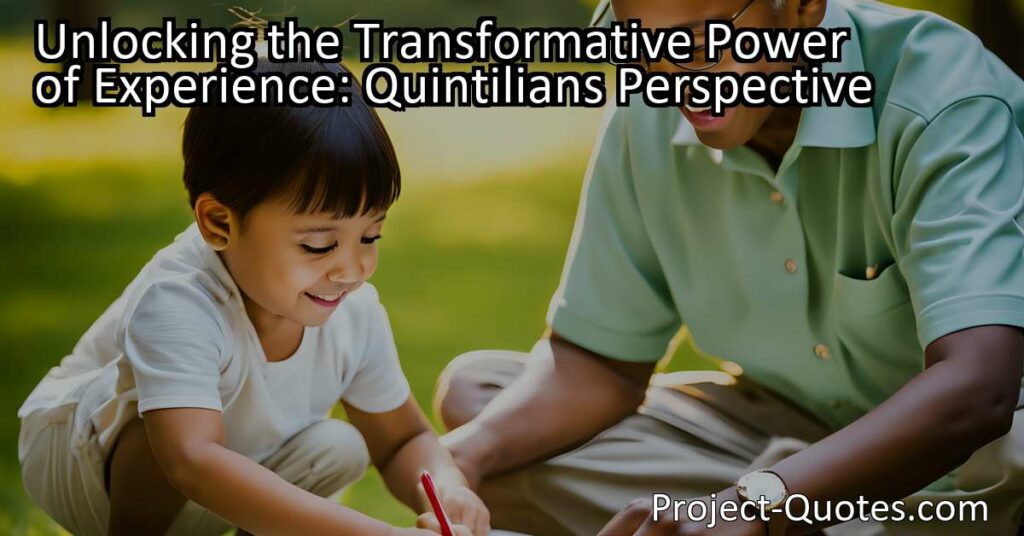In almost everything, experience is more valuable than precept.
Quintilian
Unlocking the Transformative Power of Experience: Quintilian’s Perspective suggests that following recipes without ever experimenting can limit growth and innovation. While precepts provide a foundation, experiencing and learning from mistakes allows for greater understanding and problem-solving skills. By actively seeking out new opportunities and reflecting on experiences, one can harness the power of experience and acquire valuable lessons that can’t be obtained solely through instruction.
Table of Contents
Meaning of Quote – In almost everything, experience is more valuable than precept.
Have you ever wondered why some people seem to have unlimited knowledge and wisdom while others struggle to navigate through life’s challenges? Well, Quintilian, a renowned Roman rhetorician of the 1st century AD, may have an answer for you. According to him, “In almost everything, experience is more valuable than precept.” But what does that really mean, and how can we apply this idea to our daily lives? In this article, we will delve into the concept of experience versus precept and explore why Quintilian believed experience to be superior.
Firstly, let’s break down the quote. Quintilian suggests that experience holds greater value than precept in “almost everything.” Precepts, in this context, refer to rules or principles that are taught or passed down to us. On the other hand, experience encompasses the knowledge and understanding gained through personal encounters and firsthand involvement in various situations. Quintilian implies that the lessons learned from direct experiences trump those learned solely through instruction or theory.
Consider the following scenario to better understand this idea: imagine you are preparing to bake a cake for the first time. You have two options you can either follow a recipe diligently or seek guidance from someone who has baked numerous cakes before. While the recipe provides instructions and precepts on how to create the cake, the experienced baker can offer valuable insights, tips, and solutions to potential challenges that may arise. Quintilian argues that the advice from the experienced baker carries more weight because it is rooted in real-world encounters and a deep understanding of the baking process.
One reason why experience holds higher value, according to Quintilian, is that it brings depth and nuance to our understanding. While precepts offer general guidelines, they often fail to capture the intricacies and complexities of real-life situations. Let’s take the example of learning a musical instrument. You may study music theory and understand the principles behind playing a particular piece, but it is only through hours of practice that you truly develop the skill and finesse needed to bring the music to life. The experience of playing the instrument offers invaluable insights into the subtleties of tempo, dynamics, and expressiveness that cannot be fully conveyed through precepts alone.
In addition, experience enables us to develop practical wisdom or what the ancient Greeks called “phronesis.” This type of wisdom goes beyond mere knowledge and theory; it involves the ability to discern the appropriate course of action in specific circumstances. Think of a doctor who has just completed medical school versus a seasoned physician who has treated countless patients over the years. While both possess knowledge of medical theories and practices, it is the experienced doctor who can quickly diagnose complex conditions and make effective treatment decisions. The seasoned physician’s experience has honed their judgment and intuition, allowing them to navigate the intricacies of patient care more effectively.
Furthermore, experience has the power to shape our character and values. Through lived experiences, we encounter diverse perspectives and challenges that push us to reflect on our beliefs and values. Consider the example of an individual growing up in a homogeneous community with little exposure to different cultures or ways of life. While they may have learned about diversity in precepts, it is only when they engage with individuals from various backgrounds and experiences that their understanding deepens. The personal encounters can challenge preconceived notions and foster empathy and open-mindedness. In this way, experience becomes a catalyst for personal growth and the development of well-rounded individuals.
It is important to acknowledge that precepts also play a critical role in our learning and development. In many cases, they provide the initial framework upon which experience is built. Precepts provide foundational knowledge, allowing us to understand the context and purpose behind the experiences we encounter. They help us establish a starting point and guide our initial actions. For example, when learning how to swim, a beginner needs precepts such as arm and leg movements, breathing techniques, and water safety guidelines to develop a basic understanding. However, as the learner spends more time in the water and gains experience, they begin to refine their technique, adapt to different conditions, and develop a fluid and efficient swimming style.
While precepts may provide a solid foundation, Quintilian argues that relying solely on them without gaining hands-on experience can be detrimental. In fact, he suggests that excessive reliance on precepts can hinder one’s growth and limit their ability to navigate real-life situations effectively. Let’s return to our baking analogy if one were to only follow recipes without ever experimenting or making mistakes, they would be restricted to a narrow range of baked goods and lack the ability to innovate or troubleshoot when faced with unexpected challenges.
So, how can we harness the power of experience in our own lives? It starts with being open to new opportunities and actively seeking out experiences that challenge us. Whether it is exploring different hobbies, volunteering in our communities, or taking on new responsibilities, we can expose ourselves to a variety of situations that expand our knowledge and understanding. By actively engaging in experiences, we can develop a deeper sense of empathy, adaptability, and problem-solving skills.
Moreover, reflecting on our experiences is crucial for extracting the wisdom they offer. Taking the time to process and evaluate our encounters allows us to internalize the lessons learned and apply them in future situations. For example, if you were assigned to lead a team project and encountered difficulties in communication and collaboration, reflecting on the experience can help you identify areas for improvement and develop strategies for more effective teamwork in the future.
In conclusion, Quintilian’s assertion that “In almost everything, experience is more valuable than precept” holds true in various aspects of our lives. Experience brings depth, nuance, and practical wisdom that precepts alone cannot provide. It shapes our character, enhances our understanding, and enables us to navigate the complexities of life with greater skill and confidence. While precepts play an important role in building foundational knowledge, they should not overshadow the significance of firsthand experiences. By embracing new opportunities, actively engaging in diverse experiences, and reflecting on our encounters, we can unlock the transformative power of experience and cultivate a deeper understanding of the world around us. So, let us not simply rely on what we are taught, but rather, let us be open to the invaluable lessons that can only be acquired through experience.
I hope this quote inspired image brings you hope and peace. Share it with someone who needs it today!


